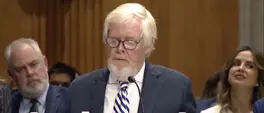PSC warns against political interference as 7th administration begins work
Nokukhanya Mntambo
9 July 2024 | 5:07Several hotshots in government have come under fire for meddling in State institutions and departments, compromising service delivery across the country.
JOHANNESBURG - The Public Service Commission (PSC) has warned against political interference as the seventh administration begins its work.
A number of hotshots in government have come under fire for meddling in state institutions and departments, compromising service delivery across the country.
ALSO READ: PSC: There needs to be consequences for departments that fail to pay service providers
State-owned entities (SOEs) – including Eskom, Transnet, and South African Airways (SAA) – are among institutions that have been brought to their knees by political pressure.
Speaking at a media briefing in Pretoria on Monday, PSC commissioner Anele Gxoyiya said poor separation of powers is bad for business.
“Public servants know what is right and they should stand by what is right. They should advise their principals about what is right. Therefore, you are not forced to carry out an unlawful instruction. Try it – defy that instruction and see what is going to happen. The Public Service Commission is there to protect employees.”
The PSC has also warned the new ministers against making drastic changes to departments as they settle into their new offices.
The commission cautioned the new administration following concerns that some directors-general (DGs) would soon be out of a job as ministers bring in their own people.
The public sector watchdog released its latest quarterly report in Pretoria on Monday.
PSC commissioner Vusi Mavuso said there cannot be an overhaul of departments without following due processes.
“It is not up to ministers to willy-nilly come with a skop, skeet, en donner that DGs must pack up and go because they don’t want them. All directors-general are appointed on a fixed term period, usually it’s five years. Therefore, it is incumbent upon ministers to be able to strike a relationship with their DGs before they can even come to a conclusion that they want their own.”
Get the whole picture 💡
Take a look at the topic timeline for all related articles.
Trending News
More in Politics

19 December 2025 10:14
Flights cancelled, roads flooded as rare storm soaks UAE

19 December 2025 03:40
Treasury’s threats to withhold funding for 75 municipalities will create new challenges – expert

18 December 2025 15:37
US Senate confirms Leo Bozell as ambassador to South Africa amid strained relations












